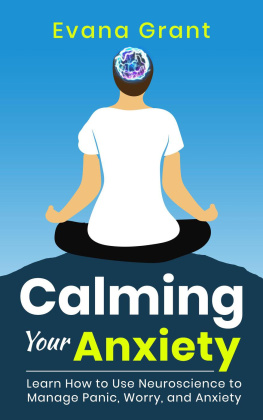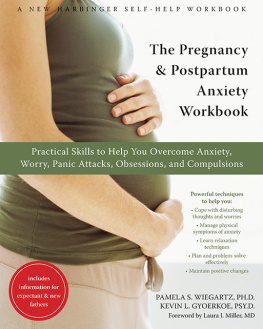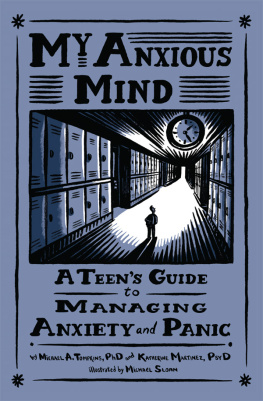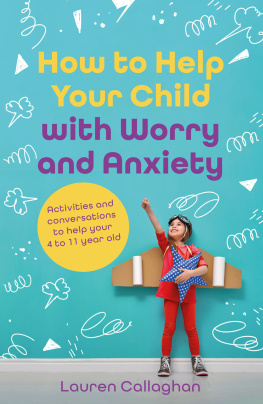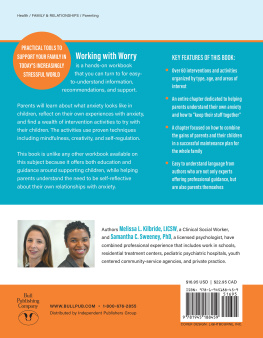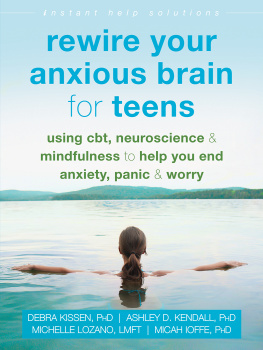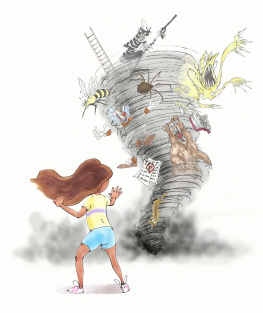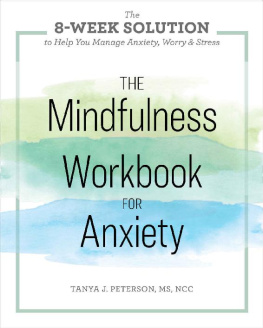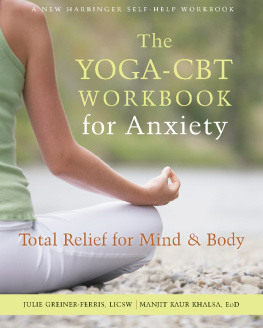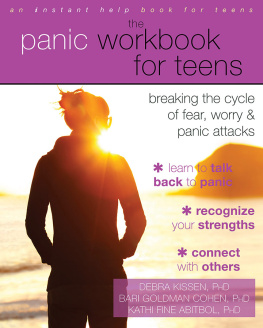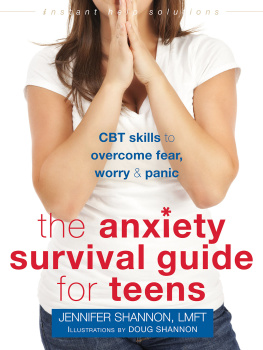1. About Anxiety
You Need to Know
Anxiety is a common feeling usually described as uneasiness or apprehension. At one time or another, everyone experiences anxiety. It is highly treatable and manageable.
The feeling of anxiety has been described with many different words. Here are some of them:
- stress
- edginess
- apprehension
- the jitters worry
- jumpinessnervousness
- the shakes
- fear
- butterflies
- uneasiness
- freaking out
- panic
- disquiet
- agitation
- angst
While everyone experiences anxiety, some of us feel it more often, some more deeply, some less frequently, and some less intensely. Your own experience of anxiety will depend on:
- Geneticshow your parents, grandparents, and ancestors experienced anxiety
- Brain chemistrythe type, amount, and movement of the chemicals working in your brain
- Life eventsthe situations you are faced with in your life
- Personalityhow you look at and interpret things that happen to you
Genetics, brain chemistry, and life events are factors that you have little or no control over. Your personality, or the way you perceive and handle life events, is something you have a great deal of control overprobably more than you realize. For that reason, most of the activities in this book will focus on working with your personality, helping you to understand the way you look at and respond to life and suggesting ways to do it that will help you to lower your anxiety level.
Directions
Your closest ancestors are your mother, father, grandparents, and great-grandparents on both sides of your family. In person, by phone, or in writing, interview as many of these people as you can. Ask them the following questions and record their answers on separate sheets of paper.
- Which of the following words would you use to describe anxiety? (Read or show them the list on the preceding page.)
- Would you describe yourself as a highly anxious, moderately anxious, or rarely anxious person, and why?
- Explain how you experience the feeling of anxiety in your body, mind, and emotions.
- Explain what you do to manage anxiety when you feel it.
- Describe how any or all of your responses may have changed over the course of your life.
Now ask yourself the same questions and record your answers here:
- _______________
- _______________
- _______________
- _______________
- _______________
More to Do
Look back over the answers to your relatives interview questions. Describe any patterns you see in the answers.
_______________
_______________
How do your relatives answers compare to your answers?
_______________
_______________
What, if anything, do you better understand about yourself in relation to anxiety by having learned about your relatives?
_______________
_______________
10. Overgeneralizing
For You to Know
When people overgeneralize, they assume that because they had one negative experience in the past, they will always have the same negative experience in the futureeven though there is no evidence for that. This assumption raises their anxiety level whenever they encounter a situation that has been negative, even just once, in the past. People who overgeneralize often use the words always, never, no one, everyone, all, and none.
When Lauren asked a boy she liked to the school dance, he said no. She thought, No one will ever want to date me; Im always being rejected. She began to feel anxious anytime she was with a boy she liked.
When Lauren dropped her lunch tray in the school cafeteria, which had never happened before, she told herself, It figures; Im such a klutz. Im always causing accidents. Lauren became nervous about dropping food and dishes even when she was at home clearing the kitchen table.
When Lauren babysat for the first time, the baby had an earache and wouldnt stop crying. Lauren told herself, Ill never be good with children; Ill make a terrible mother. When she was called to babysit again, she got nervous just thinking about it and turned the job down.
These kinds of overgeneralized thoughts caused Laurens anxiety level to go up in any situation where her past experience hadnt been perfect.
Directions
The kids in the pictures below are having negative experiences. Next to each picture, write an overgeneralizing statement they might make about their situation that would raise their anxiety level. Use the words always, never, no one, everyone, all, or none. Then, write a more realistic statement that could lower their anxiety level.
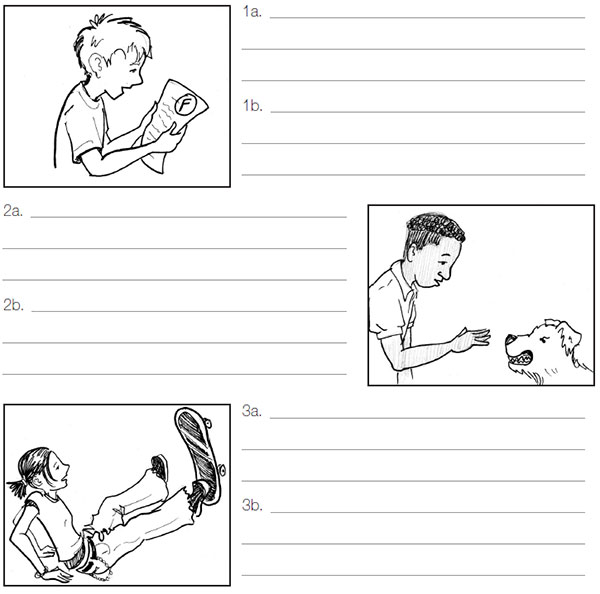
More to Do
For the next few days, keep a record here of any statements you make that use the words always, never, no one, everyone, all, and none. Describe the situation you were in when you made each statement.
_______________
_______________
_______________
_______________
Look back at what you have written. Describe any patterns you notice in the subject areas or situations that you overgeneralize about.
_______________
_______________
_______________
_______________
Now rewrite the statements, replacing the overgeneralizing words with more accurate words.
_______________
_______________
_______________
_______________
Read both groups of sentences aloud to yourself, paying attention to your anxiety level as you read them. Notice which statements make you feel more anxious.
11. "Should" Statements
For You to Know
Using the word should is appropriate when there is something we need to do or a way we need to act in order to be responsible or courteous. But shoulds can get out of control and raise your anxiety level when they are unrealistic or unimportant.
Brandon was frequently anxious because so many of his thoughts used the word should. When he was riding the bus to school, he thought, I should be using this time to study. When he was at a chess club meeting, he thought, I should be in a sport instead. It would be so much cooler. When his bike chain broke and he didnt know how to fix it, he thought, I should be more competent and know how to fix this myself. When he failed a math test because he had gone to a baseball game instead of learning the material, he thought, I should have studied harder for this test.
Brandons counselor helped him to think more carefully about his should statements to see how realistic or important they were. Here is what he discovered about his thoughts:
- I should be using this time to study.
I spend several hours on homework each night. My grades are good. Realistically, if I spend every waking moment studying, I will burn out quickly. It is probably healthier to use my time on the bus as a mental break.
- I should be in a sport instead. It would be so much cooler.
Some kids think that sports are cooler than chess. But I dont really like sports and I do like chess. Im not that good at sports and Im great at chess. I would rather have fun in the chess club than be miserable in sports just because of what some kids think. My real friends like me no matter what.



